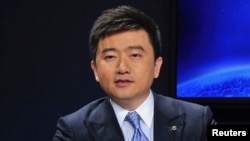Chinese authorities detained a top Chinese news anchor shortly before a nightly broadcast, state media reported, as authorities extend anti-corruption efforts deeper into the country's media industry.
Rui Chenggang, the popular host of financial news programs on China Central Television (CCTV), was taken away from his studio on Friday, ruling Communist Party mouthpiece the People's Daily said on its Twitter account.
Rui's detention, along with the network's vice director of financial news Li Yong, comes a little more than a month after officials announced an investigation into suspected bribery by his boss, CCTV's advertising director and director-general of its finance and economics channel Guo Zhenxi.
The government has cracked down on official corruption and extravagance in China since the appointment last year of President Xi Jinping, who has said widespread graft threatens the party's survival.
An indication of the suddenness of Rui's detention, a second microphone appeared on the set of Friday night's "Economic News" broadcast, though it was anchored only by Rui's co-host.
"Rui Chenggang was directly taken away from CCTV by authorities last night [Friday] and no notice was given at the time to the program," Caixin.com cited an unnamed CCTV employee as saying.
Rui, 36, is one of China's most prominent business journalists, whose strongly nationalist stances and controversial remarks have helped make him a celebrity.
Rui is fluent in English and known for his "big get" interviews, often interviewing corporate and world leaders, such as Microsoft founder Bill Gates and former U.S. President Bill Clinton.
Forbidden City Starbucks
His prominence in China grew in 2007 after he protested the presence of a Starbucks shop at Beijing's Forbidden City and helped start a grassroots movement that eventually kicked the U.S. brand out of the historic site.
Rui's Twitter-like Sina microblog, on which he has more than 10 million followers, was still accessible on Sunday and some CCTV web pages still contained his biographical details.
CCTV could not be immediately reached for comment.
Shanghai media platform "The Paper" quoted CCTV sources as saying Rui and his family members allegedly set up a public relations company which made use of his influence for "seeking profits."
The report said the public relations firm took fees from some of Rui's interview subjects for arranging activities in China including meetings with government officials, as well as payments for the type and duration of coverage they would receive from CCTV.
The network is viewed by the government as an enormously influential and useful propaganda tool abroad, and at home where Beijing keeps a tight rein on domestic media.
Critics have long pointed to corruption within the ranks at state media, arguing blackmail is widespread and that journalists are susceptible to bribery.
President Xi has vowed to take down powerful "tigers" as well as lowly "flies" in his graft-busting campaign and inspection teams have fanned out across China.
The official Xinhua news agency reported over the weekend that inspectors had found graft in construction and land projects in the Xinjiang Production and Construction Corps.
It also said that a senior party official from the southern Yunnan province, Zhang Tianxin, had been removed from his post for suspected discipline violations, a euphemism for corruption.
Some information for this report provided by Reuters, AP and AFP.





